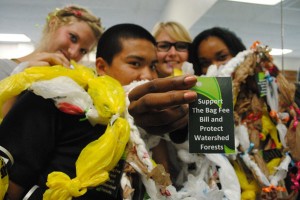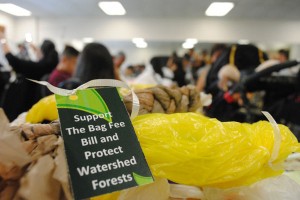Using plastic bags on a daily basis seems to be an everyday habit for everyone. But no one would ever realize how many plastic bags people end up having at their homes and how much damage this could bring to the environment.
On March 2, 25 students from the Hogan Entrepreneur Program, ecology class and Civic Engagement Club joined an event that was organized at the YWCA, situated by the state capitol, hoping influence a positive change in our environment, a change for the better.
“The attractive aspect of it is that it attempts to reduce both paper and plastic,” said Robert Harris, organizer and director of Sierra Club, Hawaii Chapter. “Rather than simply eliminating one item (plastic or paper) the hope is to move people to the greener option, using re-useable bags.”
The primary objective of this event was to create leis, a part of the Hawaiian culture, using what we all would consider as everyday trash: plastic bags. After the leis were made, participants headed to the state capitol in groups to pass them out to the senators hoping to get more people to know about the plastic bag bill. By passing this bill, a small amount of statewide fee on plastic and paper throwaway bags is enforced on Oahu to protect the island’s environmental life.
“I got to experience what it was like to be in support of a bill and actually do something about it at the capitol,” said Chardonnay Pao, a junior at Chaminade.
“I thought it was cool that they used the culture of Hawaii to save its own land,” said Kristen Rothermel, a sophomore at Chaminade. “You wouldn’t see people making plastic bag leis anywhere on the mainland but because its part of the culture here they were trying to use that to get the point across that we have to take more respect of the land … or the land will not be the same as it once was, being the beautiful place Hawaii is.”
Students had approximately an hour to focus on creating a variety of leis that differed in size, color and length. By the time participants headed to the state capitol, each student had four to five leis in their hands ready to pass out to the senators.
After participating in the event, Chaminade students started to learn about the plastic bag bill in a deeper level, and students began to support the idea of place a statewide fee on using plastic bags.

“I really support this idea,” Pao said. “It’ll be the first step in giving people the opportunity to look for alternatives instead of being too comfortable to take that bag that is offered to use freely. With the tax, it’ll give them the opportunity to find the alternative.”
“I hope they would take away that civic engagement can be a lot of fun,” Harris said. “Some issues that most people care about – like clean water, clean air and healthy communities tend not to get as much attention as they deserve. The only way to move forward with a more sustainable future for Hawaii is to get people actively advocating for common-sense policies.”
Hawaii currently consumes approximately 500 million plastic bags per year. Maui, Kauai and Big Island have already put a ban in plastic bags. Oahu is the only island left that has yet to place a ban on the use of plastic bags.
“Oahu may have a tougher time getting used to something like that (plastic bag bill),” Pao said. “I’m sure that the other islands had a hard time too. We have a huge community here and we have a city-typed setting. It’ll be a little difficult, but I think that with time people will learn to appreciate it just as the people in the other islands did.”

Based on the turnout from the event, Harris hopes to get more people involved to bond together and improve the environment into a sustainable future for the better.
“If we only take individual actions and do nothing else, we will continue to pollute the environment, degrade our coastlines, poison our air and water and lose our chance at a more sustainable future for Hawaii,” Harris said. “Preferably, we stand together and promote policies that decisively move us in the type of future that we all want. The paper/plastic throwaway bag and the terrific participation by Chaminade students is a small but important step in that direction.”